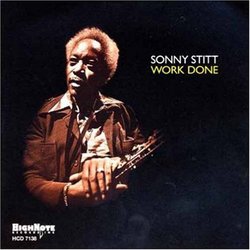| All Artists: Sonny Stitt Title: Work Done Members Wishing: 0 Total Copies: 0 Label: Highnote Release Date: 4/26/2005 Genres: Jazz, Pop, Broadway & Vocalists Styles: Soul-Jazz & Boogaloo, Bebop, Traditional Vocal Pop Number of Discs: 1 SwapaCD Credits: 1 UPC: 632375713829 |
Search - Sonny Stitt :: Work Done
 | Sonny Stitt Work Done Genres: Jazz, Pop, Broadway & Vocalists
|
Larger Image |
CD Details |
CD ReviewsConsummate Workmanship: A Sleeper That Could Be an Awakener Samuel Chell | Kenosha,, WI United States | 03/13/2006 (4 out of 5 stars) "This 2005 release of "new" music is fine, representative Stitt and should be picked up by students of the saxophone (and American Songbook) as well as Stitt collectors. Sonny has learned by this time (1976) how to pace himself, making his statements in a chorus or two yet doing so with headspinning technical command, satisfying emotional expressiveness, and willful structural wholeness. No saxophonist does greater justice by the song itself while revealing the possibilities it holds for inventive improvisatory development. With a session like this, Sonny reveals why, though not as innovative and complex as his primary progenitor on the alto saxophone, he is otherwise a more polished and "perfect" version of Bird. Sonny's return to form in the 1970's is, in many respects, admirable if not awe-inspiring: he recovered most of his extraordinary musical gifts even while denying himself the self-indulgences that had begun to lead to their decline.
Contrary to the implications of the title, this is far from Sonny Stitt's swan song. In fact, six years later he would again appear at San Francisco's Keystone Corner for a less "controlled," more spirited session (currently available as "Just in Case You Forgot How Bad He Really Was"). Curiously, Sonny looks older and more haggard in the 1976 photos for "Work Done" than he does for the photos taken for "Last Sessions," his 32 Jazz CD (out of print) recorded days before his death in 1982--all the more testimony that in 1976 Sonny was playing through pain, rededicating himself to the muse that had begun to slip away from him by the early '70's. Stitt followers should take no small amount of consolation from the enormous amount of self-discipline and professional pride that led this commanding player back to the top of his game, even as a rapid, virulent cancer was about to take it away from him. As for the music, if you've ever heard Sonny play a Bb blues, skip the first track. It's "too much" of more of the same, with Sonny's addiction to the tonic all too evident in the numbingly repetitious B flats. But by the 2nd tune, "Indiana," Sonny begins to get it going, feeding off of the crowd's enthusiasm and his responsive rhythm section, anchored by Ray Drummond's virile, potent bass. "Constellation," an "I Got Rhythm" tune played as fast as humanly possible, features more B flats, but the alternate tonguings and attacks, the rhythmic displacements, the crisp articulations make them sound fresh and inspired (how did that nonsense about Johnny Griffin being the "fastest tenor" ever get started?). "You Are the Sunshine of My Life" and "Stardust" both conclude with dazzling, unaccompanied cadenzas, the first played on tenor, the 2nd on alto (a recording of "Stardust," incidentally, that strikes me as deserving a place right alongside the "classic" ones by ones by Louis, Artie Shaw, Lionel Hampton, Desmond and Coltrane). The closer, "Loose Walk," is another Bb blues, but again Sonny infuses each Bb with life, energy, and surprise in what proves to be an exhilarating finale to the set. The audio and mix are sub-par (piano and drums are somewhat distant) but are nevertheless light-years beyond some other currently available on-location Stitt recordings (avoid like the plague any Stitt session with either "Ronnie Scott" or "Left Bank" in the title). And Sonny's glorious sound, so pure yet so full-throated, "embodied," and soulful, is not to be denied. In sum, this latest release is a most welcome addition to the Stitt catalog (choose it ahead of another recent CD of "new" but perfunctory Stitt playing--"It's Magic," on Delmark). Still, considering that the CD isn't an example of Stitt's very best playing and has less than professional audio fidelity, it's sobering to realize that so many sterling Stitt sessions ("Sonny Stitt with the Oscar Peterson Trio," "Endgame Brilliance") are no longer in-print." |

 Track Listings (10) - Disc #1
Track Listings (10) - Disc #1